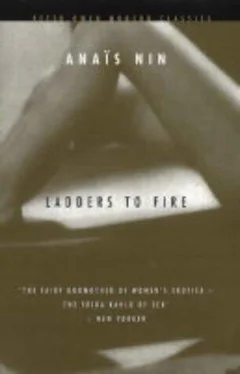Anaïs Nin - Ladders to Fire
Здесь есть возможность читать онлайн «Anaïs Nin - Ladders to Fire» весь текст электронной книги совершенно бесплатно (целиком полную версию без сокращений). В некоторых случаях можно слушать аудио, скачать через торрент в формате fb2 и присутствует краткое содержание. Год выпуска: 2004, ISBN: 2004, Издательство: Peter Owen Limited, Жанр: Классическая проза, Эротические любовные романы, на английском языке. Описание произведения, (предисловие) а так же отзывы посетителей доступны на портале библиотеки ЛибКат.
- Название:Ladders to Fire
- Автор:
- Издательство:Peter Owen Limited
- Жанр:
- Год:2004
- ISBN:9780720611625
- Рейтинг книги:5 / 5. Голосов: 1
-
Избранное:Добавить в избранное
- Отзывы:
-
Ваша оценка:
- 100
- 1
- 2
- 3
- 4
- 5
Ladders to Fire: краткое содержание, описание и аннотация
Предлагаем к чтению аннотацию, описание, краткое содержание или предисловие (зависит от того, что написал сам автор книги «Ladders to Fire»). Если вы не нашли необходимую информацию о книге — напишите в комментариях, мы постараемся отыскать её.
Cities of the Interior
Children of the Albatross
The Four-Chambered Heart
A Spy in the House of Love
Solar Barque
Ladders to Fire — читать онлайн бесплатно полную книгу (весь текст) целиком
Ниже представлен текст книги, разбитый по страницам. Система сохранения места последней прочитанной страницы, позволяет с удобством читать онлайн бесплатно книгу «Ladders to Fire», без необходимости каждый раз заново искать на чём Вы остановились. Поставьте закладку, и сможете в любой момент перейти на страницу, на которой закончили чтение.
Интервал:
Закладка:
It was ineffectual, inarticulate, unmoving to others as the attempted crying out of the mute.
Everybody understands hunger, illness, poverty, slavery and torture. No one understood that at this moment at which she crossed the street with every privilege granted her, of not being hungry, of not being imprisoned or tortured, all these privileges were a subtler form of torture. They were given to her, the house, the complete family, the food, the loves, like a mirage. Given and denied. They were present to the eyes of others who said: “You are fortunate,” and invisible to her. Because the anguish, the mysterious poison, corroded all of them, distorted the relationships, blighted the food, haunted the house, installed war where there was no apparent war, torture where there was no sign of instruments, and enemies where there were no enemies to capture and defeat.
Anguish was a voiceless woman screaming in a nightmare.
She stood waiting for Lillian at the door. And what struck Lillian instantly was the aliveness of Djuna: if only Gerard had been like her! Their meeting was like a joyous encounter of equal forces.
Djuna responded instantly to the quick rhythm, to the intensity. It was a meeting of equal speed, equal fervor, equal strength. It was as if they had been two champion skiers making simultaneous jumps and landing together at the same spot. It was like a meeting of two chemicals exactly balanced, fusing and foaming with the pleasure of achieved proportions.
Lillian knew that Djuna would not sit peacefully or passively in her room awaiting the knock on her door, perhaps not hearing it the first time, or hearing it and walking casually towards it. She knew Djuna would have her door open and would be there when the elevator deposited hr. And Djuna knew by the swift approach of Lillian that Lillian would have the answer to her alert curiosity, to her impatience; that she would hasten the elevator trip, quicken the journey, slide over the heavy carpet in time to meet this wave of impatience and enthusiasm.
Just as there are elements which are sensitive to change and climate and rise fast to higher temperatures, there were in Lillian and Djuna rhythms which left them both suspended in utter solitude. It was not in body alone that they arrived on time for their meetings, but they arrived primed for high living, primed for flight, for explosion, for ecstasy, for feeling, for all experience. The slowness of others in starting, their slowness in answering, caused them often to soar alone.
To Djuna Lillian answered almost before she spoke, answered with her bristling hair and fluttering hands, and the tinkle of her jewelry.
“Gerard lost everything when he lost you,” said Djuna before Lillian had taken off her coat. “He lost life.”
Lillian was trying to recapture an impression she had before seeing Djuna. “Why, Djuna, when I heard your voice over the telephone I thought you were delicate and fragile. And you look fragile but somehow not weak. I came to…well, to protect you. I don’t know what from.”
Djuna laughed. She had enormous fairy tale eyes, like two aquamarine lights illumining darkness, eyes of such depth that lit first one felt one might fall into them as into a sea, a sea of feeling. And then they ceased to be the pulling, drawing, absorbing sea and they became beacons, with extraordinary intensity of vision, of awareness, of perception. Then one felt one’s chaos illumined, transfigured. Where the blue, liquid balls alighted every object acquired significance.
At the same time their vulnerability and sentience made them tremble like delicate candlelight or like the eye of the finest camera lens which at too intense daylight will suddenly shut black. One caught the inner chamber like the photographer’s dark room, in which sensitivity to daylight, to crudity and grossness would cause instantaneous annihilation of the image.
They gave the impression of a larger vision of the world. If sensitivity made them retract, contract swiftly, it was not in any self-protective blindness but to turn again to that inner chamber where the metamorphosis took place and in which the pain became not personal, but the pain of the whole world, in which ugliness became not a personal experience of ugliness but the world’s experience with all ugliness. By enlarging and situating it in the totality of the dream, the unbearable event became a large, airy understanding of life which gave to her eyes an ultimately triumphant power which people mistook for strength, but which was in reality courage. For the eyes, wounded on the exterior, turned inward, but did not stay there, and returned with the renewed vision. After each encounter with naked unbearable truths, naked unbearable pain, the eyes returned to the mirrors in the inner chambers, to the transformation by understanding and reflection, so that they could emerge and face the naked truth again.
In the inner chambers there was a treasure room. In it dwelt her racial wealth of Byzantine imagery, a treasure room of hierarchic figures, religious symbols. Old men of religion, who had assid at her birth and blessed her with their wisdom. They appeared in the colors of death, because they had at first endangered her advance into life. Their robes, their caps, were made of the heavily embroidered materials of rituals illumined with the light of eternity. They had willed her their wisdom of life and death, of past and future, and therefore excluded the present. Wisdom was a swifter way of reaching death. Death was postponed by living, by suffering, by risking, by losing, by error. These men of religion had at first endangered her life, for their wisdom had incited her in the past to forego the human test of experience, to forego the error and the confusion which was living. By knowing she would reach all, not by touching, not by way of the body. There had lurked in these secret chambers of her ancestry a subtle threat such as lurked in all the temples, synagogues, churches—the incense of denial, the perfume of the body burnt to sacrificial ashes by religious alchemy, transmuted into guilt and atonement.
In the inner chamber there were also other figures. The mother madonna holding the child and nourishing it. The haunting mother image forever holding a small child.
Then there was the child itself, the child inhabiting a world of peaceful, laughing animals, rich trees, in valleys of festive color. The child in her eyes appeared with its eyes closed. It was dreaming the fertile valleys, the small warm house, the Byzantine flowers, the tender animals and the abundance. It was dreaming and afraid to awaken. It was dreaming the lightness of the sky, the warmth of the earth, the fecundity of the colors.
It was afraid to awaken.
Lillian’s vivid presence filled the hotel room. She was so entirely palpable, visible, present. She was not parceled into a woman who was partly in the past and partly in the future, or one whose spirit was partly at home with her children, and partly elsewhere. She was here, all of her, eyes and ears, and hands and warmth and interest and alertness, with a sympathy which surrounded Djuna—questioned, investigated, absorbed, saw, heard…
“You give me something wonderful, Lillian. A feeling that I have a friend. Let’s have dinner here. Let’s celebrate.”
Voices charged with emotion. Fullness. To be able to talk as one feels. To be able to say all.
“I lost Gerard because I leaped. I expressed my feelings. He was afraid. Why do I love men who are afraid? He was afraid and I had to court him. Djuna, did you ever think how men who court a woman and do not win her are not hurt? And woman gets hurt. If woman plays the Don Juan and does the courting and the man retreats she is mutilated in some way.”
“Yes, I have noticed that. I suppose it’s a kind of guilt. For a man it is natural to be the aggressor and he takes defeat well. For woman it is a transgression, and she assumes the defeat is caused by the aggression. How long will woman be ashamed of her strength?”
Читать дальшеИнтервал:
Закладка:
Похожие книги на «Ladders to Fire»
Представляем Вашему вниманию похожие книги на «Ladders to Fire» списком для выбора. Мы отобрали схожую по названию и смыслу литературу в надежде предоставить читателям больше вариантов отыскать новые, интересные, ещё непрочитанные произведения.
Обсуждение, отзывы о книге «Ladders to Fire» и просто собственные мнения читателей. Оставьте ваши комментарии, напишите, что Вы думаете о произведении, его смысле или главных героях. Укажите что конкретно понравилось, а что нет, и почему Вы так считаете.












